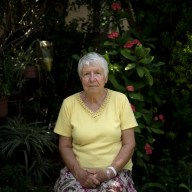 Josephat Torner — albino rights campaigner from Tanzania and subject of Harry Freeland’s documentary “In the Shadow of the Sun.”
Josephat Torner — albino rights campaigner from Tanzania and subject of Harry Freeland’s documentary “In the Shadow of the Sun.”
Credit: In the Shadow of the Sun
In Tanzania, white skin can be deadly. It is not just the fierce Sun that preys on albinos, although skin cancer is the main cause of a life expectancy below 35. The real terror is the industry that trades their body parts, believing them to hold magic powers, causing over 130 murders and mutilations since 2008.
This is the grim backdrop for ‘In the Shadow of the Sun’, the surprisingly uplifting odd couple story of young British film-maker Harry Freeland and fearless albino activist Josephat Torner. Six years in the making, the documentary charts Torner’s travels across his country, and then the world, in search of recognition for albinos.
“My mother was advised to poison me,” Torner, 36, says in an interview at Metro’s London offices. Born as the only albino in a family of 35 children, he was “a shame to the whole community”. But after a childhood of torture and stigma, he was sent to a specialist school for albinos, and began work for disability charities.
“I met Harry at an albino day protest,” Torner recalls. “After that we started to travel together and raise awareness.”
Some of the film’s most powerful scenes are of Torner confronting prejudice in remote villages, often the scene of recent albino killings. “We had scary moments,” says Freeland, 24. “There were a number of death threats and at times Josephat was talking to murderers.”
The activist goes on to climb Mount Kilimanjaro – Africa’s tallest mountain – despite the physical suffering engendered by his condition. “When I was tired I listened to the voices of the people I had lost, and I knew that if I did not make it we will all suffer,” says Torner.
The impact is already being felt, with the Tanzanian government finally prosecuting albino killers and establishing more specialist schools, and one politician adopting albino children after meeting Torner. The odd couple are now working hard to expose the lucrative body-part industry, after Torner’s next challenge: climbing Mount Everest.
















